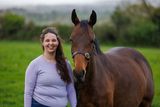Why the busy OAP is the smartest OAP
As a new study proves keeping active as we age protects our brains, we ask the experts how to stay forever young
Sonic youth: Des Geraghty (72), has shown no signs of slowing down since his retirement as president of SIPTU in 2003. Photo: Mark Condren
Are you one of those enviable older people who never seem to stop? Do you race from a morning spent volunteering at your local charity shop to lunch with the ladies to an afternoon minding the grandkids topped off by an evening yoga class? If that sounds like you, it looks as though you could be doing yourself - and your brain - a massive favour. New research has shown that keeping busy may have a protective effect on the ageing brain.
The Dallas Lifespan Brain Study, which looked at 330 people between the ages of 50 and 89, shows that people with a busy lifestyle have improved memory, reasoning and vocabulary, and can process information faster than their less busy peers.
The findings are not a surprise to Professor Sabina Brennan, a psychologist who co-directs a dementia research programme in the Institute of Neuroscience in Trinity College Dublin.
"It is possible to reduce our risk of developing dementia and even delay the onset of symptoms, and there are no secrets or magic tricks involved," she says. "It's quite straightforward, and it's free. Stay physically and mentally active, eat healthily, don't smoke, take alcohol in moderation, and socialise.
"Social isolation is not only bad for brain health, it actually increases the risk of dementia. People with more social ties live longer, have better cognitive function and are less depressed than those who keep to themselves. Loneliness and isolation are as bad for health as smoking and obesity."
So it's not just keeping busy that improves brain function, it's the quality of the busyness - what you do and who you do it with - that can keep you sharp.
"Research shows that social interaction for just 10 minutes a day can increase brain performance and may deliver greater benefits than solving crossword puzzles," says Professor Brennan.
"I don't like to describe it as 'busyness', as you can busy yourself doing mindless tasks. It's more about engaging, challenging, contributing and empowering. Seize the day. The activity doesn't have to be cerebral; it could be singing or dancing, for instance. If you're fond of a particular kind of music, listen to a different genre. The brain gets used to certain patterns, and introducing it to new ones keeps it active."
Since retiring as director of training at Age and Opportunity last year, 65-year-old Helen Campbell is busier than ever. As vice-president of Age Platform Europe, she attends monthly meetings in Brussels and travels to conferences around the globe.
"I have two grandchildren, who keep me on my toes, and I love to write, but I make sure there's always time to smell the roses," she says.
She also speaks French and recently learned Italian, another great way of exercising the brain. Research shows that people who speak a second language get dementia four years later than those who don't.
"We need to stop thinking of education as something you do in school or college, and get into the mindset of lifelong learning," says Professor Brennan.
"Learning generates new brain cells, stimulates the connections between them and opens up new routes that the brain can use to bypass damage. Certain areas of the brain are responsible for specific functions, such as motor function, vision, language and so on.
"However, when one part of the brain breaks down through injury or disease, cells in areas adjacent to the damage can change their function and shape to take on the function of the damaged cells. This capacity of the brain to change itself in response to the stimulation of learning and experience is called neuroplasticity."
She points to 1989 research that described 10 cases of cognitively normal older adults who were discovered to have advanced Alzheimer's Disease pathology in their brains at death. Even though they had the physical signs of the disease, they had no perceptible symptoms of disease. "The brain is the most complex structure in the universe," says Professor Brennan. "We want to keep it functioning at optimum levels as long as possible. When we asked people what they fear most about getting older they said losing memory, losing independence, and getting dementia."
With people living longer - life expectancy is now 82.8 years for Irish women and 78.4 years for men - it's not the days in your life, but the life in your days that makes life worth living.
"Attitude is a key factor. Being busy shouldn't be stressful. Chronic stress shuts off the growth of neurons in the brain, so next time somebody pushes your button, ask yourself, 'Is this worth me getting holes in my brain?' And if the answer is no, then let it go."
For more information see: hellobrain.eu; freedemliving.com; sabinabrennan.ie
'You retire from your job, not your life'
Des Geraghty's schedule is more hectic than ever since his retirement as president of SIPTU in 2003. Now, at 72, there are no signs of him slowing down, and he wouldn't have it any other way.
"You retire from your job, not from life," says the former politician and trade union leader who packs more into his average week than many half his age.
He enjoys playing the flute, singing and writing, he's on the Central Bank Commission and the board of TG4 - and that's just for starters.
He's a past Chairperson of Poetry Ireland and the Affordable Homes Partnership and still keeps an active interest in music and arts bodies, affordable housing, social history and equal rights. He tries to walk an hour a day and particularly enjoys walking around Cornmarket in Dublin's Liberties, where he was born.
He's fluent in Irish and has some French. Where does he find the time, or the energy?
"I do things I choose," he says. "Well, I didn't choose the Central Bank job - the late Brian Lenihan, then minister for finance, persuaded me to do that, in 2010, and then the governor, Patrick Honohan, asked me to chair the Risk Committee, which I did for five years.
"It was challenging, but interesting and important. Being a director of TG4 is a special joy. I was excited by that opportunity. As a minority language channel, it brings something different - súil eile - and it delivers.
"It pioneers women's sport, does fantastic history, social and current affairs programmes, and has been the stimulus for a raft of independent production companies who got their grounding in TG4.
"My heart is in Irish culture, language, music and social history. It was cultivated by my mother, and my own children play music too. I have three daughters and five grandchildren, between Dublin, West Cork and Connemara.
"I've written several books, including one on Luke Kelly, who was a personal friend, and one called Forty Shades of Green, which records the important role migrants play in Ireland and celebrates the new ideas and philosophies they bring. I'd like to write more, when I get the time.
"Most of all, I've found that giving is more valuable than taking, and far more satisfying."
- Celine Naughton
Join the Irish Independent WhatsApp channel
Stay up to date with all the latest news














